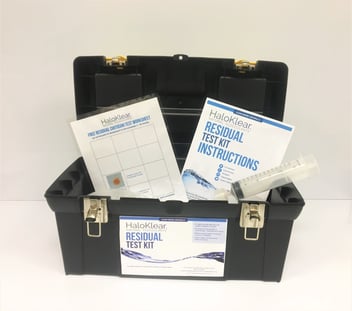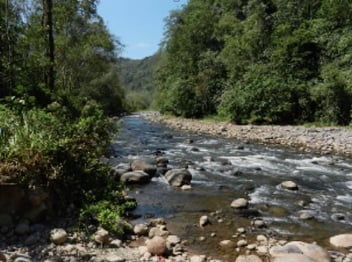INTERN VIEW: The benefits of using natural products
After learning about the differences between coagulation and flocculation and how Dober products work, I wanted to learn more about what sets HaloKlear water treatment products apart from traditional, synthetic ones.
By talking to Dr. Joe Drozd, Research Chemist in the water treatment lab, I have a better understanding of what makes Dober unique. Currently, much of the water treatment industry uses synthetic chemicals, such as Alum or Anionic Polyacrylamide (aPAM).
Dober's water treatment products are made from plants and chitosan, in other words, from renewable resources, and are not by-products of rare minerals or metals. Being naturally-derived offers many benefits, particularly in environmental health and safety.
Those benefits include:
- No trace monomers = safe for human health
- Naturally biodegrades in the environment
- Safe and sustainable to use
- Can be used in sensitive ecosystems
This is what I learned from Dr. Joe:
Q: What are some advantages that naturally-derived products have over synthetic products?
A: With both chitosan and plant-based products, one of the main advantages is their being naturally derived and safe to use. There are no trace monomers. Synthetic coagulants and flocculants are usually made from acrylamide; they are polyacrylamide varieties. Those polymers always cont ain a small amount of monomeric acrylamide which has some detrimental properties, namely that they say that it may be carcinogenic. Functionally, synthetic chemicals work pretty much the same as our products. It’s the safety and sustainability and the environmental benefits that are a key feature of the naturally-derived products. Plants and chitosan are both carbohydrates, and carbohydrates degrade naturally in the environment. Mother nature is more attuned to degrading natural materials than synthetic ones.
ain a small amount of monomeric acrylamide which has some detrimental properties, namely that they say that it may be carcinogenic. Functionally, synthetic chemicals work pretty much the same as our products. It’s the safety and sustainability and the environmental benefits that are a key feature of the naturally-derived products. Plants and chitosan are both carbohydrates, and carbohydrates degrade naturally in the environment. Mother nature is more attuned to degrading natural materials than synthetic ones.
Q: Are there some situations where it would be better to use chitosan instead of synthetic polymers?
A: Where we like to use chitosan is in areas that are extremely sensitive to environmental regulations and safety. Both of our chitosan and plant-based products are safe. They’re  sustainable; they’re renewable. The places where we use chitosan have a pretty good chance that the treated water could be entering a water course—a stream or a lake or even into sewers—where you don’t want to contaminate the environment directly. The reason our customers choose our natural products is to be able to reuse the water in their treatment process and generate solid waste that is easily disposable with no adverse environmental effects. This give them the ability to maintain low costs and not impose any harsh impact on the sensitive waterways.
sustainable; they’re renewable. The places where we use chitosan have a pretty good chance that the treated water could be entering a water course—a stream or a lake or even into sewers—where you don’t want to contaminate the environment directly. The reason our customers choose our natural products is to be able to reuse the water in their treatment process and generate solid waste that is easily disposable with no adverse environmental effects. This give them the ability to maintain low costs and not impose any harsh impact on the sensitive waterways.
MY MAIN TAKEAWAYS:
Being environmentally friendly is extremely important to me, especially given my education in Environmental Engineering. Working for a company that gives high importance to sustainability is very fulfilling. It's reassuring to know that there are people that care about keeping our environment clean for future generations.
To read more posts like this, subscribe below.






